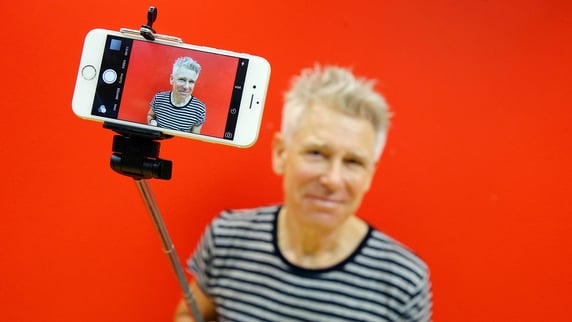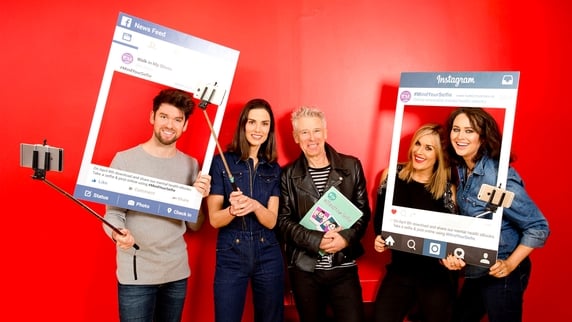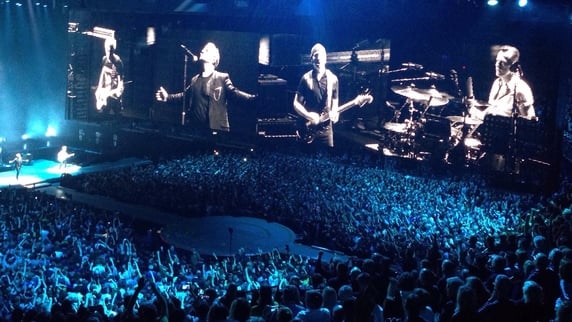
Bono surprised a New York audience Friday night when he jumped off the stage at the Hammerstein Ballroom midway into "Mysterious Ways." It was the last song in a short set of U2 tunes that the singer was performing with Nile Rodgers and Chic at the We Are Family Foundation gala, and the revelers – most of whom had left their $1,500-a-plate tables to dance up front – made an easy path for him. He stopped midway through the room, climbed on a chair and belted the song's lyrics about how the "spirit moves in mysterious ways." Then, in just a few strides, he made his own mysterious way out of the building – but not without speaking the night's motto as Rodgers' guitar rang out the song's final notes: "We are family."
Rodgers and his wife, Nancy Hunt, put the event together to raise money for the We Are Family Foundation, a not-for-profit organization that aims to promote a "global family" by focusing on educating young adults about respect and diversity. Early in evening, the Chic guitarist said his goal was to raise $1 million for the Foundation, which they ultimately accomplished with an auction, but the event as a whole also seemed like a celebration of creativity and compassion.
In addition to Bono, whose efforts to combat poverty in Africa and AIDS around the world, the event honored President Jimmy Carter, who accepted a "Peacemaker" award named after a young poet he once befriended, Mattie Stepanek, who had died at age 13 in 2004 after a battle with a rare form of muscular dystrophy. Between Bono's moves and Carter's moving speech, it was a gala full of surprises.
At the beginning of the evening, Rodgers stepped up to the podium holding a Stratocaster and began to tell the story of how he'd written "We Are Family," after using a sequence of chords he'd heard in a song by Children of God. "I only play that as an example that you can get an idea, and it just germinates and it blossoms and it grows – especially if you care and you have a big heart," he told the crowd. "That's what we stand for." Throughout the night, he and Hunt demonstrated that philosophy as they welcomed "youth ambassadors" to discuss how the organization had benefited them.
One young person who was involved with the We Are Family Foundation from its inception was Mattie Stepanek, whose mother Jeni gave a passionate speech about her son's admiration for Carter. Mattie had become infatuated with Carter and wanted to emulate his peaceful philosophies, and he got to share a friendship with the president a few years before his death. When Carter spoke, he dedicated his touching speech to Stepanek's memory. He talked about how the last three years of his young companion's life had affected him greatly ("It was a valuable friendship, an enjoyable friendship and it grew day by day," he said) to the point that when he received the Nobel Peace Prize in 2002, he said he felt like Stepanek shared the honor with him.
"I've known many famous people: kings and queens, great scientists, presidents, prime minister," he said. "I've known Mother Teresa. Nelson Mandela was a great friend of mine. We spent many times together. But I can tell you without equivocation that the most remarkable human being I've ever known was Mattie Stepanek."

After Carter spoke, the Foundation recognized the Adobe Project 1324, which promotes positive social change among young adults through creativity, and it began an auction. Items up for bid included dinner with Rodgers, a Greek getaway, an opportunity to showcase three songs for the CEO of Atlantic Records and a guitar lesson with Rodgers, among others. The pièce de résistance turned out to be the guitar Rodgers played during the David Bowie tribute at this past February's Grammys ceremony. It had been signed by Lady Gaga, LL Cool J, Dave Grohl, Beck, Skrillex, Rodgers and others, but as it went up to the crowd with a starting bid of $10,000, Bono autographed it and it sold for $100,000.
But Bono's true value at the event was not just his signature. Before the event began, Rodgers told Rolling Stone on the red carpet what it meant to him to have the U2 singer there. "Not only is Bono an incredible friend but he is at the top of the food chain when it comes to being a philanthropist and just a great humanitarian," the guitarist said.
When Bono accepted the honor, he gave his trophy to a young woman from the We Are Family Foundation who had introduced him ("It's better to give an award than to receive it," he said). "[With] the We Are Family Foundation, the gift is not just to see the future but to find those who can build the future," he said.
Bono then spent most of his time talking about the other luminaries there: Rodgers and Carter. He praised the way the guitarist had turned bad times growing up into (the song) "Good Times." Regarding Carter, Bono said that growing up during the Troubles in Ireland, he'd been impressed that the president quoted Bob Dylan and had an affinity for quoting scripture. "He presented a whole different way of thinking about American power," he said. "He made human rights a national mandate. He counted his success not by the wars that he waged but by the peace he made possible." He closed by comparing Carter to "great heroes of peace": Robert Kennedy, Mother Teresa and Martin Luther King, Jr., just as Rodgers and Chic – all dressed in white – kicked into U2's King tribute "Pride (In the Name of Love)".
Before the event, Rodgers told Rolling Stone that he'd asked to play "Pride," as it was one of his favorite songs. With Chic, the song picked up an almost transcendent quality as the beat got a little more disco-y, Rodgers played the riff crisply and the horn section played the occasional accents around Bono's "whoa-oh-oh-oh."
The Chic guitarist also picked the other selections. The guitar line in "I Still Haven't Found What I'm Looking For" rang anew as a more subtle song, gilded with female backup vocals and Rodgers' a bluesy, buoyant solo, as Bono sang the melody soulfully and smiled wide. "Beautiful Day" was greeted with a huge audience response, as fans danced and waved glow sticks previously used during the auction in the air. Bono just nodded along, grinned and blissed out.

"It's a very special feeling to be on this stage with this extraordinary band and these singers," Bono told the audience between songs. "It's a very incredible thing for me not to be onstage with my three brothers. I always feel like one quarter of an artist without them."
He also talked about Rodgers' importance to his band. "Edge doesn't look up to many guitar players, but Nile's right at the top for him. I tried to get the band here, but everyone's doing something. I said, 'Edge, this is such a hero to you.' He said, 'Listen, I just can't get out of something.' I said, 'What are you doing?' He said, 'I'm doing a gig in the Sistine Chapel with the Holy Father.'" The audience laughed. "I said, 'Well, I'm doing a gig at the Hammerstein Ballroom, and we are going to turn it into the cathedral that it has been over the years for rock & roll music and hip-hop and dance music. And I am with the 'groove Pope.' To which Edge had nothing to say." He introduced "Mysterious Ways," which took on new life with a horn part that swelled with the guitars, and then disappeared into the crowd as it ended.
After a brief pause after Bono's departure, Rodgers led Chic in a thrilling set of hits he'd written and produced over the years. "Stay there," he told the crowd. "It's party time." From Chic's "Everybody Dance" and "Le Freak" to "Let's Dance" by "the man who changed my life," David Bowie, and Daft Punk's "Get Lucky," it was a showcase of Rodgers' breadth. He played his oft-imitated jittery, nimble guitar lines as the audience danced and swelled toward the stage around the tables up front. The night ended, of course, with Sister Sledge's "We Are Family." Dozens of concertgoers stormed the stage, as Kathy Sledge sang the anthem next to Rodgers. It was a display of unity. "I hope to see everybody next year," said the guitarist. "Let's do it again."
http://www.rollingstone.com








